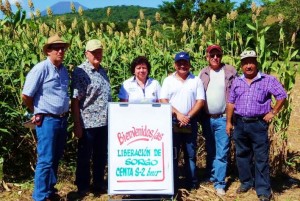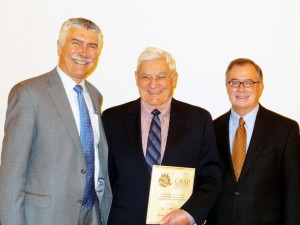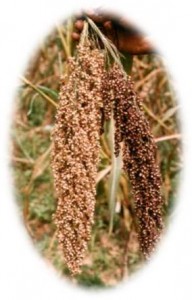Learning from Success: INTSORMIL 1979-2013
After 33 years, the International Sorghum and Millet Collaborative Research Support Program (INTSORMIL CRSP) closed on March 29, 2013. Based at the University of Nebraska in Lincoln, Nebraska since 1979, the program contributed enormously to global food security both overseas and in the US. It has developed and introduced dozens of new sorghum lines and reached thousands of smallholder farmers. It has also helped to develop or refine sorghum products, from beer to baked goods for people and feed for animals.
In the beginning, INTSORMIL was known as the Sorghum/Millet Collaborative Research Support Program (CRSP), according to the account in its first annual report, published in 1980. The report notes that the CRSP came about after nearly two years of preparation and planning that was carried out by the University of Missouri under a USAID contract between 1977-1979. It was one of two CRSP projects to take shape. In July 1979, the program received its first five-year authorization. The eight participating land-grant universities (U of Arizona, Florida A&M U, Kansas State U, U of Kentucky, Mississippi State U, U of Nebraska, Purdue U, and Texas A&M ) chose University of Nebraska-Lincoln to have the position of the Management Entity, under the leadership of Earl Leng and Administrative Technician Janet Deshayes.

INTSORMIL with its partner CENTA releases a new variety of sorghum in El Salvador in December 2011. From left to right:Bill Rooney, Texas A&M; John Yohe, Dtr INTSORMIL; Vilma Calderon, CENTA; Mario Parada Jaco, CENTA; E.A. Short Heinrichs, INTSORMIL; Rene Clara Valencia, CENTA.
In 2010, Program Director John Yohe contributed to the restructuring of the Collaborative Group on International Agricultural Research (CGIAR) programs on cereals, helping to identify priority topics for the future. INTSORMIL researchers have included the 2009 World Food Prize recipient Gebisa Ejeta of Purdue University, currently serving as one of the university representatives to the Presidentially-appointed Board for International Food and Agriculture Development, whose research seeks to enhance sorghum’s resistance to the Striga weed and its tolerance to drought. Principal Investigator Gary Peterson of Texas A&M University breeds sorghum varieties in Lubbock, Texas, many of which are taken up and used by U.S. private industry. Researchers William Rooney and Lloyd Rooney also of Texas A&M University, among others, have developed drought-resistant varieties of sorghum for Central America. Bruce Hamaker of Purdue University works to improve sorghum flour for use in prepared foods, while other scientists address sorghum’s resistance to pests and disease. Joe Hancock of Kansas State University, has worked with feed processors to expand the use of sorghum grains in poultry and other animal feeds. The list of accomplishments is long and the story is well told in the 2011 report, “INTSORMIL: More than 30 Years of Excellence” and in the program’s final report on the INTSORMIL website. The INTSORMIL website will stay up until November 2013.
INTSORMIL research in the classroom and the field is the training ground for both human and institutional capacity building, as the program exemplifies “learning by doing.” By 2011, it had educated over 1100 graduate students, of which nearly half (48%) were women. Its graduates are leading or working with some of the world’s most prestigious agricultural research and policy institutions, in US universities, CGIAR centers, government ministries, and centers such as the Alliance for a Green Revolution in Africa.
Program Director Dr. John Yohe has led INTSORMIL since joining as its Associate Director in 1984 and becoming the Program Director in August 1987, following Directors Glen Vollmar and Earl Leng. He received his doctoral degree from the University of Missouri for research on mung beans in India, later working in Brazil and Korea. Yohe came to the CRSP from USAID, where he worked from 1977 to 1984, helping to envision the shape of the Collaborative Research Support Program, and writing much of the first set of CRSP Guidelines, the operational guidance that provided the management principles for the set of programs defined under Title XII of the International Development and Food Assistance Act of 1975.

INTSORMIL CRSP Program Director John Yohe (center) after receiving his award from the CRSP Council on October 15, 2012 with Rob Bertram, director of USAID’s Office of Agricultural Research and Policy in Technology in the Bureau for Food Security and Brady Deaton, chair of the Board for Food and Agricultural Development (BIFAD).
Dr. Yohe has also been a keen leader of the CRSP Council, serving longer than anyone else as Chair of the Council. He was Chair when the first Council bylaws were set down, and managed many change processes over the years up to the present structure when the Council and USAID meet in a partners meeting every year. He has seen the CRSPs through years of abundance and retrenchment, showing vision combined with pragmatism, ably balancing the program’s mutual goals of improving agriculture both in developing countries and the US in partnership with US, international, and host country institutions. At the CRSP Council meetings in Iowa last year (October 2012), Yohe was given a special award by the Council, “in recognition of his long and distinguished service to the CRSPs.” The Council honored Yohe with the words, “John, as was written in the letter sent to you in announcing this award, you have played an instrumental role in keeping the CRSP model alive through challenging times. As a founding father of the CRSPs, it is with pleasure and the deepest respect that we thank you for your service and passion to the vision and implementation of collaborative research that you helped to create and protect. We thank you on behalf of the current CRSPs, the CRSPs that are no longer, and the CRSPs yet to come.”
Since 2006, INTSORMIL has benefited from the experience of Elvis (Short) Heinrichs as Assistant Director. Heinrichs, an entomologist, previously served as the Program Director of the Integrated Pest Management CRSP (2002-2005) at Virginia Tech in Blacksburg, VA.
Both Program Director John Yohe (phone: 402-472-7056; email: jyohe1@unl.edu) and Assistant Director Elvis (Short) Heinrichs (phone: 402-472-6011; email:eheinrichs2@unl.edu) will continue at UNL in emeritus status with an office in 108 Biochemistry Hall. After May 2013, their shared phone number will be 402-472-6011.
 The INTSORMIL program could not have functioned as effectively and efficiently as it did without a supportive team, which for many years has consisted of Joan Frederick, administrative and financial officer, Kimberly Christiansen, business support associate, and Diane Sullivan, accounting associate. Joan Frederick started with the CRSP in the 1980s and unquestionably knew more about its operations – or where to find out what was needed — than anyone. She was ably assisted by Diane Sullivan, who was also the project officer for the Mali Associate Award, and Kimberly Christiansen. Kimberly also backstopped the CRSP Council website (www.crsps.org), the gateway to information about all the CRSPs prior to formation of the current Digest website in 2012, as well as for the INTSORMIL CRSP project website. She served as the project officer for the BMR Associate Award and handled TrainNet responsibilities.
The INTSORMIL program could not have functioned as effectively and efficiently as it did without a supportive team, which for many years has consisted of Joan Frederick, administrative and financial officer, Kimberly Christiansen, business support associate, and Diane Sullivan, accounting associate. Joan Frederick started with the CRSP in the 1980s and unquestionably knew more about its operations – or where to find out what was needed — than anyone. She was ably assisted by Diane Sullivan, who was also the project officer for the Mali Associate Award, and Kimberly Christiansen. Kimberly also backstopped the CRSP Council website (www.crsps.org), the gateway to information about all the CRSPs prior to formation of the current Digest website in 2012, as well as for the INTSORMIL CRSP project website. She served as the project officer for the BMR Associate Award and handled TrainNet responsibilities.
Note: For any future business items pertaining to INTSORMIL, contact Benjamin D. Lennander, Financial Associate, Agronomy and Horticulture, (phone: 402-472-6238; email:blennander2@unl.edu).
